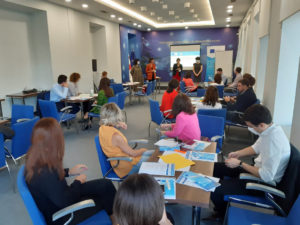
Technical Assistance for Implementation of Civil Society Dialogue and Civil Society Support Programmes (TR2015/DG/01/A5-01/001)
The overall aim of the project is to increase bilateral exchanges and cooperation between CSOs in Turkey and the EU at local, regional and national levels, to promote awareness raising initiatives on importance and benefits of membership of Turkey to the EU within Turkey and EU and on

Training and Establishing Meal Department (Monitoring, Evaluation, Accountability, And Learning)
The implementation of effective monitoring, evaluation, accountability, and learning (MEAL) are vital to the success of all programs. In this regard, the purpose of the project was to provide accountability to their stakeholders through information sharing and developing complaints or feedback mechanism which can help to guide program

Facility for the Implementation of the EU-Georgia Association Agreement- II
The project aims to strengthen the capacity of public institutions in Georgia to meet the country’s commitments under the EU-Georgia Association Agreement (AA), including the Deep and Comprehensive Free Trade Area.

Technical Assistance for Promoting Youth Employment
The participation of young people in the labour market is a challenging topic for every country. To increase the employability and entrepreneurship of young people, one needs to attract and retain more people in employment by promoting youth employment and decreasing the unemployment rate of young people. Within

Technical Assistance for Support to the Local Human Rights Boards and Women’s Rights Awareness
Despite laws being passed in the 1990s to eliminate discrimination against women and a law to protect survivors of domestic violence being enacted in 1998, the country lags behind in implementing its national and international gender equality commitments. Women in Turkey continue to face challenges, with gender-based violence

Technical Assistance for Promoting Registered Employment
Unregistered employment remains one of the critical concerns and significant challenges of the Turkish labour market. Even though recent years have seen a downward trend in unregistered employment, a substantial portion of Turkey’s workforce is still employed without being registered with the social security system. In this regard,

